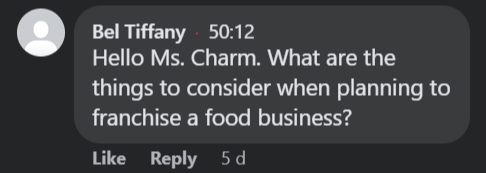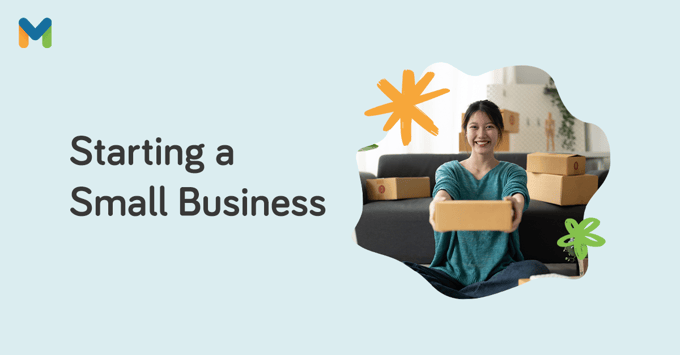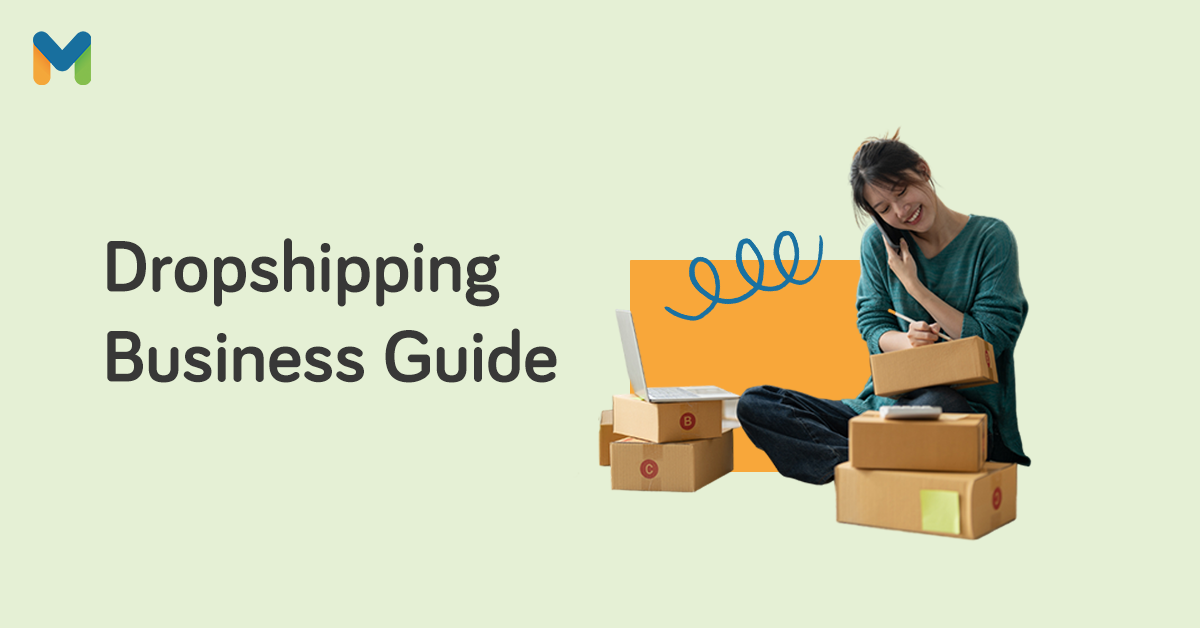Many biz giants that make the products or services you’re consuming today started small. Apple and Google started in a garage. Jollibee was once a humble ice cream parlor before it became a food titan that acquired known brands like The Coffee Bean and Tea Leaf, Mang Inasal, and Burger King. Potato Corner used to be a food cart business before it turned into an international food franchise brand.
Before they reached the glorious success they’re enjoying right now, the founders took the time to plan everything, observe trends, and take risks. If you want to start a venture that can potentially become the next big thing in the country (or in the world!), know that there are no shortcuts to great feats.
Want to learn how to take your first step toward making it big? The recent webinar hosted by Moneymax, dubbed "#Moneyfest: Starting Your First Business," sought to answer that very question. Speaker Charm De Leon, an entrepreneur herself and the founder of Ready2Adult PH, shared insights and recounted firsthand experiences. If you missed it, we've recapped important bits from her talk below.
Read on for the steps and tips on how to start a small business in the Philippines.
13 Steps to Starting a Small Business in the Philippines
Step 1: Create a New Market or Benchmark
Be innovative! You have two choices as to what business you want to venture into.
First, offer something that's not yet on the market. How can you make your business stand out? Think creatively and identify an innovative product or service that can satisfy the needs or provide a solution for your target customers.
Second, benchmark successful businesses. Observe what they're doing right and create something greater.
Step 2: Validate Your Small Business Idea

You may have something in mind that you believe will be a big hit. But does your small business idea really have the potential to succeed?
Conduct market research[1] before you start a small business. Find out if the product or service you're considering selling is something people need and would be willing to pay for.
"See how feasible that business is. By this point, you don't even have to put up capital just yet. Research and learn everything you can about that business. Has it been done before? What are the businesses you'll be competing with? Is it available in other countries? Find a similar business model that you can possibly base a pattern on," Charm added.
Already have a validated business idea? Check out these articles on how to get started!
- The Business of Water: How to Start a Water Refilling Station
- Wash and Earn: How to Start a Car Wash Business in the Philippines
- What’s Cooking? How to Start a Catering Business from Home
Step 3: Plan Your Business Finances
When figuring out how to start a small capital business in the Philippines, know that you still need money to buy equipment, tools, supplies, and materials, as well as to cover ongoing costs for six to 12 months before you make a profit.
Start by listing down all the required expenses for starting your business. Group them into two categories:
- One-time startup costs: Market research, branding, licenses and permits, initial inventory, grand opening event, etc.
- Ongoing costs: Rent, marketing, employee salaries, taxes, etc.
It's also important to have backup funds. When you start a business, you have to allocate backup funds (aside from your initial capital) that will sustain your business.
After all, it will take time for your product to be known. When you're starting out, it's normal to suffer some losses. If you don't have backup funds, how will you sustain your business?
Need to add more funds to start your business? Try applying for a personal loan. If you want to compare possible options for the best loan in the Philippines, you can easily do so and even apply through Moneymax.
Just make sure you don't mix business with personal funds. "A lot of new business owners, once they get income from the business, they immediately think that's their money. They spend it on things that are not for the business. The problem is, when you're starting out, you need that capital to roll over and grow your business. My advice is to keep a separate bank account for your business and a separate balance sheet," said Charm.
💼 Launch or Expand Your Small Business With an #UNOnow Loan
Ready to start or grow your small business? If you're planning to secure funds to buy inventory, pay for a bigger space, or hire employees, check out what UNO Digital Bank has to offer.
With an #UNOnow Loan, you can borrow funds starting at ₱10,000 up to ₱200,000 with a monthly interest rate of 2%. You can pay it back in six, 12, 18, 24, or 36 monthly installments.
Apply for an UNONow Loan via Moneymax now!
Step 4: Decide on Your Business Structure
Primarily, this will influence the way your business will operate. It will also determine the kind of risks that your personal assets will face. More importantly, it will give you an idea of what kind of legal protection you need.
Small businesses may consider these two types of ownership:
- Sole proprietorship - In this type of ownership, everything is under your full control. Note that while the assets are all yours, all losses incurred will be yours, too.
- Partnership - This is when you decide to start a business with other individuals. Depending on the agreement among partners or the amount of contribution for the capital, the liability of each member will be either limited or unlimited.
Step 5: Choose the Right Location
When you buy a house, you need to keep this factor in mind: location, location, location. The same principle applies to starting a small business in the Philippines.
For you to get customers, you need to rent a place with high foot traffic. It could be that one tiny kiosk at the mall, a shop downtown, or a spot near the highway.
However, remember that these locations can get very expensive. Make sure you have a sizable budget. The floor area of the shop and its amenities are also major factors.
Step 6: Consult a Business Lawyer and a Tax Specialist

Starting a small business involves dealing with some legal aspects. This is why you need to consult a business attorney as much as possible. They will help make sure that the agreements with your partners and vendors don’t have any loopholes and have clauses that protect your interests.
In some cases, they also give advice on choosing the right type of business ownership or structure. They can even help you review your leasing agreement with office and retail spaces. More importantly, a business lawyer can help you protect your intellectual property.
When it comes to finances, a certified public accountant (CPA) will make sure that you stay current with the laws regarding business taxation. They will teach you the basics of computing and filing your business taxes, maximizing tax deductions, and improving the way you archive your tax-related documents
Step 7: Choose the Best Name for Your Small Business
Your business branding starts with a name. While pondering on how to start a small business in the Philippines, make sure to pick a name that not only describes what you have to offer but also ensures easy recall among consumers.
Once you've come up with at least three potential names for your business, verify if it's trademarked or if another business is already using it. If there's none, register your business name with the Department of Trade and Industry (DTI) if you're a sole proprietor.
Step 8. Build Your Brand Identity
Familiarity builds affinity. Aside from a catchy business name, you have to make sure that your brand’s identity resonates with your target audience. Are you going to be a fun family brand like Jollibee or a chic and stylish icon like Sunnies?
Here are the elements that will help you forge your brand identity.
- Logo - It’s the face of your business, so it must be easily recognizable. It can be a logotype (e.g. Coca-Cola, CNN, Disney, and Google) or a logomark (e.g. Apple’s bitten apple icon, Nike’s swoosh, or Starbucks’ two-tailed mermaid).
- Language - Your choice of words is a giveaway of your brand’s personality, mood, and tone. Going full English may mean that your brand has aspirational or premium values. Taglish, on the other hand, indicates that your business has a relaxed tone. Most of the time, pure Tagalog and a few colloquialisms show that your brand is grounded and in touch with the common people.
- Colors - Customers are heavily dependent on visuals. Colors are good visual aids, as they convey feelings and emotions and strengthen brand associations.
- Typeface - Your choice of typeface also determines the personality of your brand. Serif fonts, such as Garamond and Times New Roman, show that your brand is formal, regal, or premium. Sans serif fonts, which include Helvetica and Arial, are safe choices for businesses with straightforward offerings (think IKEA). On the other hand, rounded and curly fonts may mean that your business is chill, light, and fun.
Once you decide on the elements of your brand identity, create a brand bible that your graphic designers will follow when creating your promotional materials. A brand bible ensures that your branding elements look consistent across different materials.
For Charm, it's important to ensure that the branding suits your products and services. "Branding and products and services have to be aligned. For instance, you can't over-hype or over-class a product that's pang-masa. If you're trying to sell a product that's pang-masa, brand it in a way that's in accordance with that market. Make sure you can live up to what people are expecting."
Step 9: Apply for Licenses and Permits
In the Philippines, small capital business owners need to acquire documents to prove that they're running a legitimate enterprise. This is one rule you shouldn't ignore before starting your business, lest you get into trouble with the law later on.
After your DTI business registration, you need to get the permits. Here are the permits needed to start a business in the Philippines. Get these from the local government where you plan to build your business:
- Barangay clearance issued by the barangay hall
- Mayor's permit/Business permit issued by the municipal or city hall
- Tax Identification Number and BIR registration documents
- SSS, PhilHealth, and Pag-IBIG registration as an employer and for new employees
- Special permits depending on the nature of your business, such as registration with the Food and Drug Administration for food businesses and with the Bangko Sentral ng Pilipinas for pawnshops, remittance centers, and other financial institutions
Step 10: Pick the Right People
-3.png?width=674&height=449&name=Pics%20for%20blog%20(10)-3.png)
You need a pool of talented, hardworking, and trustworthy people to grow your business. They are your greatest asset, so you have to also take care of and grow them. With the right people, you can serve your customers better.
Identify the positions to fill and the core skills, competencies, and responsibilities for each. These will guide you through screening applicants and hiring the right ones.
If you plan to run your small business alone without any employee or contractor, you still need people you can run to for support. These could include your family and friends, a trusted mentor, or a fellow entrepreneur who can provide you with advice and motivation during the highs and lows of managing your startup.
"Every business has a team behind it. It might start with just you, but you're going to be looking for partners you'll be working with. You might not always see eye to eye, but the important thing is you're going to treat each other professionally and with respect," Charm added.
Step 11: Create Your Prototype
The heart of the business is your product or service. Make sure that what you offer is nothing but the best. This is why you need to create prototypes until you create the perfect item.
If you’re an owner of a restaurant, try out different recipes and experiment with various ingredients to create a unique dish. If you’re a shoemaker, come up with various footwear designs that embody both form and function.
When you create a prototype, you’re also figuring out which aspects of the product need improvement. You have to see to it that the product or service is flawless before it gets mass-produced or launched. If you skip this, you’ll lose money due to product recalls and customer complaints.
"Hear them out. These people might be your future customers, so their input is very important. Don't get defensive. They're trying to criticize so you can find a way to make it better," said Charm.
Step 12: Choose the Right Suppliers and Partners
Your products or services are made up of different components or processes, a lot of which are usually sourced from third-party suppliers. With that, always select the vendor or partner that understands the nature of your business. The right supplier will help you make sure that you can deliver your products on time and minimize production costs.
Step 13: Take Advantage of Social Media and Free Website Builders
-3.png?width=674&height=449&name=Pics%20for%20blog%20(12)-3.png)
Cut down on your marketing costs by tapping social networks and free website builders such as Wix and Shopify to promote your small business.
This step is especially important if you're starting an online business in the Philippines. You have to be where your target clients are. So if they're frequently on a particular social networking site, you have to build your presence there.
If you can't afford your own website, becoming a social media wizard is the next big thing. You can find various social media tips[2] to help spread the word about your business. Sometimes, you don't even have to spend a dime to go viral.
Top 5 Tips for How to Start a Small Business in the Philippines
👍 Be Resilient
As a beginning entrepreneur trying to propel your business forward, expect several bumps along the way. There'll always be setbacks to deal with. But these should not discourage you.
Instead, find the resilience to get back on your feet. For instance, the pandemic may have devastated most businesses both big and small, but it doesn't mean no one should try and start a business anymore. There are lots of pandemic-proof businesses to choose from.
The ability to survive any type of setback is what separates great businesses from mediocre ones. Start a business that will surely stand the test of time, fate, and nature itself.
Part of resiliency is learning how to constantly evolve. "A lot of new businesses close down fast because they don't live up to what the market wants. People get bored really fast, especially if you're a trendier business. The key here is to innovate," said Charm.
Related articles:
- How These Successful Filipino Entrepreneurs Overcame Pandemic Challenges
- How to Deal with the Toughest Challenges Facing a Startup Business
👍 Prepare a Contingency Plan
Sometimes, you can afford resiliency only when you’re prepared for rainy days and unexpected problems. A contingency plan will help ensure that your business will endure any unanticipated events in the future.
Include the following items in your plan:
- Insurance - This is to compensate for any losses or cover expenses in case of disasters and customer complaints.
- Data backup - Data is an integral part of your operation. Make sure that everything, from customer details to financial records and even social media analytics reports, is backed up from time to time (via cloud or a separate hard drive). Data loss makes business continuity more than challenging.
- Back-up source of income - The pandemic taught businesses to secure an alternative source of income in case worse comes to worst.
- Comprehensive exit plan - If you and your partners decide to dissolve the business, the procedure in your contract should be specific and foolproof. That way, all of you’ll be able to avoid misunderstandings and conflict.
Your aforementioned exit plan should include knowing when to let go. "Failing is part of being a business owner. You can consult with people, but you ultimately call the shots. You make business decisions every day, and this comes with the territory," Charm said.
👍 Make Data-Driven Decisions
-3.png?width=675&height=450&name=Pics%20for%20blog%20(11)-3.png)
What’s great about starting a business in this digital age is the availability of various types of tools to help with decision-making. Data helps streamline your business processes, which in turn allows you to reduce the wastage of resources, such as money and time.
"There are a lot of free tools online. Start with Google Sheets and free templates to stay on top of your finances, record-keeping, and supplier prices. This is so you can make sure you're not in the business of losing money. Otherwise, you'd be called a charity and not a business," Charm said.
But don’t be too consumed by data that you experience analysis paralysis. Sometimes, an abundance of data may impede critical decision-making.[3]
👍 Learn to Delegate
You don’t want to do all the tasks by yourself. That would be wasting your precious time!
Multiply yourself by teaching other people some of your skills. This means more time for you to do more important things for the business.
For example, you can teach someone accounting processes, so you can focus on generating sales. Make sure you teach your skills only to people you trust.
👍 Prepare to Make Sacrifices
Since you need to give a big chunk of your time to grow your business, you’re going to miss Friday nights with friends, bonding time with family, and regular sleep. There's also a possibility of losing your life savings. This goes with balancing your needs and wants so that you can follow through with your financial goals.
How to Start a Small Business in the Philippines: FAQs
Got more questions? Check if they were covered during the webinar's Q&A portion in the FAQ section below:
1. If I have only ₱10,000, can I still start a business?
Charm encourages starting a business with as minimal capital as needed. "If you're not certain yet, start as a side hustle first. You don't have to quit your job. Test the waters. It will tell you if your product or service is actually feasible."
She added that aspiring entrepreneurs can start with zero capital by providing a service. If you're planning to sell products instead, ₱10,000 is more than enough to cover prototype costs.
"Any money you earn from that, put it back into the business so you have a bigger capital to work with," she added.
2. Is there a right time to start a business?
You'd think that the right time to start a business would be largely dependent on the economy. But for Charm, not necessarily.
"It can help, but the timing you really want to get right is if you are ready. If you're very dedicated to your business, it will grow faster. But if you barely have any time for it, it will grow slower. It doesn't mean you shouldn't start a business. Just make sure the dedication you have for the business is equal to your expectation of how fast it will grow."
3. What are the things to consider when planning to franchise a food business?

Charm typically doesn't recommend aspiring entrepreneurs to start out with a franchise, as most go on to expect the business to run like clockwork.
"People have this notion that when they buy a franchise, it's going to be a sure win. But that's not how it works. First of all, make sure the products are good. Number two, the performances of other branches—are their financials good? Location is also very important for franchising. Groceries, food courts, might be good locations. Lastly, do you have the time? A franchise business is still a business you have to be hands-on with, in the beginning especially," said Charm.
Watch the full Moneymax webinar here.
Final Thoughts
A lot of Filipinos nowadays want to start a small capital business of their own. However, many disregard the science of business. Instead, they rely solely on intuition.
Before you tackle the problem of how to start a small business in the Philippines, you need to carefully study a lot of factors to ensure your business will succeed.

Sources:
- [1] Market Research Studies: Three Tips for Doing Them Right (Forbes, 2020)
- [2] 5 Social Media Marketing Tips to Boost Your Sales (Entrepreneur, 2021)
- [3] The Reasons Why Companies Continue to Make Wrong Data-Driven Decisions (The Drum, 2020)







_1200x350.png?width=734&height=214&name=UNOBank_Loan_-_Business_(Sep_2023)_1200x350.png)



